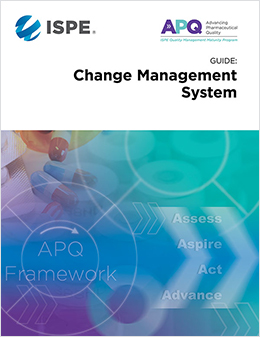APQ Guide: Change Management (CM) System

Published: February 2022
Pages: 152
What is the current state of your organization’s Change Management (CM) System? The effective management of change throughout the product lifecycle enables quality improvement and is critical to patient safety, supply reliability, as well as operational effectiveness and efficiency.
“Pharmaceutical companies are required to have a Change Management System in place, but an inadequate one may result in ineffective changes that require rework or missed opportunities,” said Guide Lead Lori Chelemedos, Founder/Principal Consultant Pac-Side LLC. “This Guide focuses on how to evaluate and optimize the system a company has, provides tools that can be used to improve the system, and offers guidance on how to improve and develop a Change Management System that is appropriate to a company’s maturity level.”
The ISPE APQ Guide: Change Management System provides a quality management framework for assessing and advancing CM system maturity level by evaluating:
- CM Documentation
- Change/Scope Identification
- Change Rationale, Impact/Level, and Risk
- Change Plan/Execution
- Post-Change Evaluation
- CM Metrics
- Governance, Management Oversight, and CM Prioritization
The ISPE PQLI® Guide: Part 3 – Change Management System as a Key Element of a Pharmaceutical Quality System focuses on what a CM system is. This ISPE APQ Guide: Change Management System focuses on how to evaluate and optimize the system that a company has.
The ISPE APQ Guide: Change Management System is the third in the planned four-part series that seeks to improve the state of pharmaceutical quality and ensure sustainable compliance. The Guide Series is part of ISPE’s newest initiative, Advancing Pharmaceutical Quality™ (APQ), a comprehensive program for assessing and improving an organization’s quality management maturity.
Built upon the ICH Q10 Pharmaceutical Quality System (PQS) model, the APQ program is an industry-led approach that seeks to advance pharmaceutical quality beyond the submission of data for harmonized, reportable metrics. The program is aligned with international initiatives that promote quality excellence, as well as with the FDA’s interest in quality management maturity and rating the maturity of manufacturing facilities, as cited in their 2019 Drug Shortages report. The result is a program that organizations can leverage to ensure a continuous supply of quality medicines to patients.
The APQ Guide Series provides a practical set of tools and systematic approaches for organizations to proactively advance the maturity and effectiveness of the following PQS elements:
- Corrective and Preventive Action system
- Management responsibilities and management review
- Change management system
- Process performance and product quality monitoring system
- Cultural Excellence
Each area will be covered in depth using the APQ framework of Assess, Aspire, Act, and Advance, providing tools and Key Performance Indicators (KPIs) for organizations to incorporate into their quality program. Each Guide will contain quantitative and qualitative tools to assess the organization’s current state of quality, diagnose gaps, and identify improvement targets – Assess and Aspire. The Guides will discuss using this information to develop an Improvement Action Plan that the organization can execute and evaluate for effectiveness – Act and Advance. The ISPE APQ Guide: Change Management System focuses on application of the APQ framework to the CM system.









